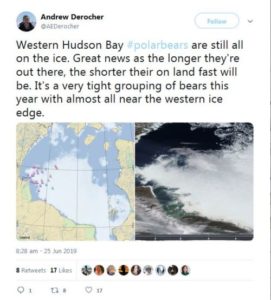by Gupta et al., July 7, 2022 in NoTricksZone
A new study (Gupta et al., 2022) indicates that from 2000-2019 73% of the 15 sites considered have been cooling and 67% have experienced a lengthening of sea ice duration.
Canada’s Hudson Bay extends into the Arctic Ocean and its coasts are teeming with polar bears.
Scientists report 11 of 15 Hudson Bay sites have been cooling since 2000. The average cooling for these 11 sites is -0.34°C per decade.
…
by Polar Bear Science, June 26, 2019
Straight from the horse’s mouth: all polar bear females tagged by researchers around Churchill in Western Hudson Bay last year were still on the ice as of 25 June. With plenty of ice still remaining over the bay, spring breakup will be no earlier this year than it has been since 1999. Contrary to predictions of ever-declining ice cover, the lack of a trend in sea ice breakup dates for Western Hudson Bay is now twenty years long (a hiatus, if you will) and yet these bears are repeatedly claimed to have been seriously harmed in recent years by a loss of sea ice.
…

…
La géologie, une science plus que passionnante … et diverse

